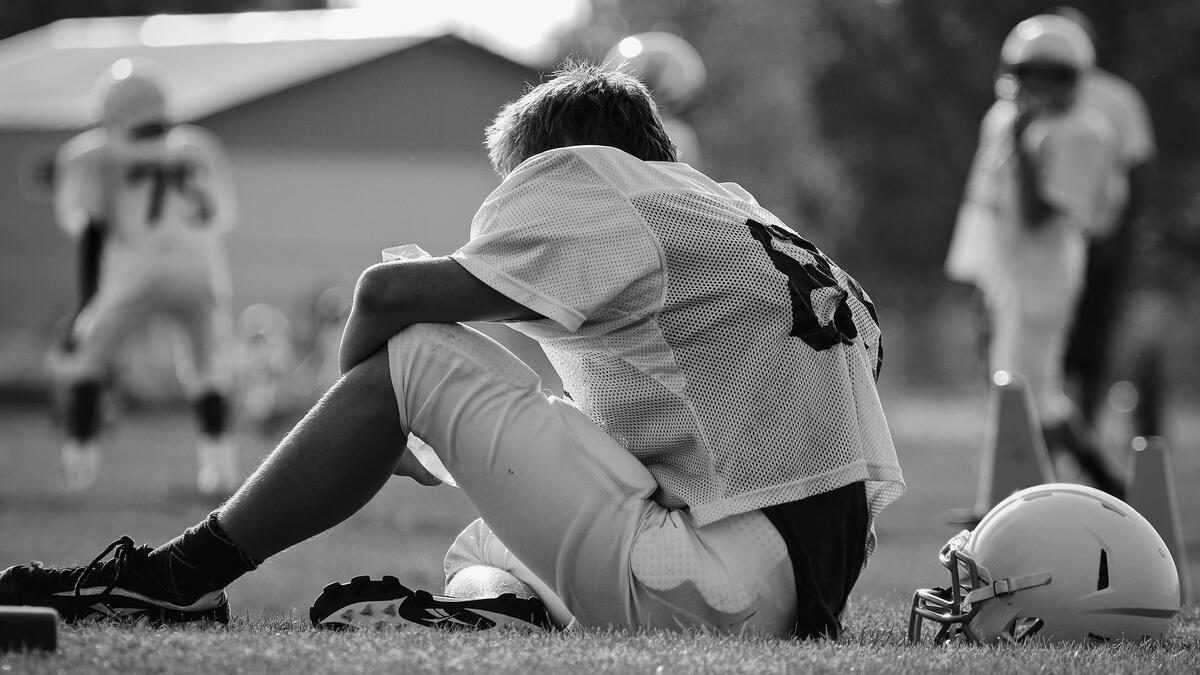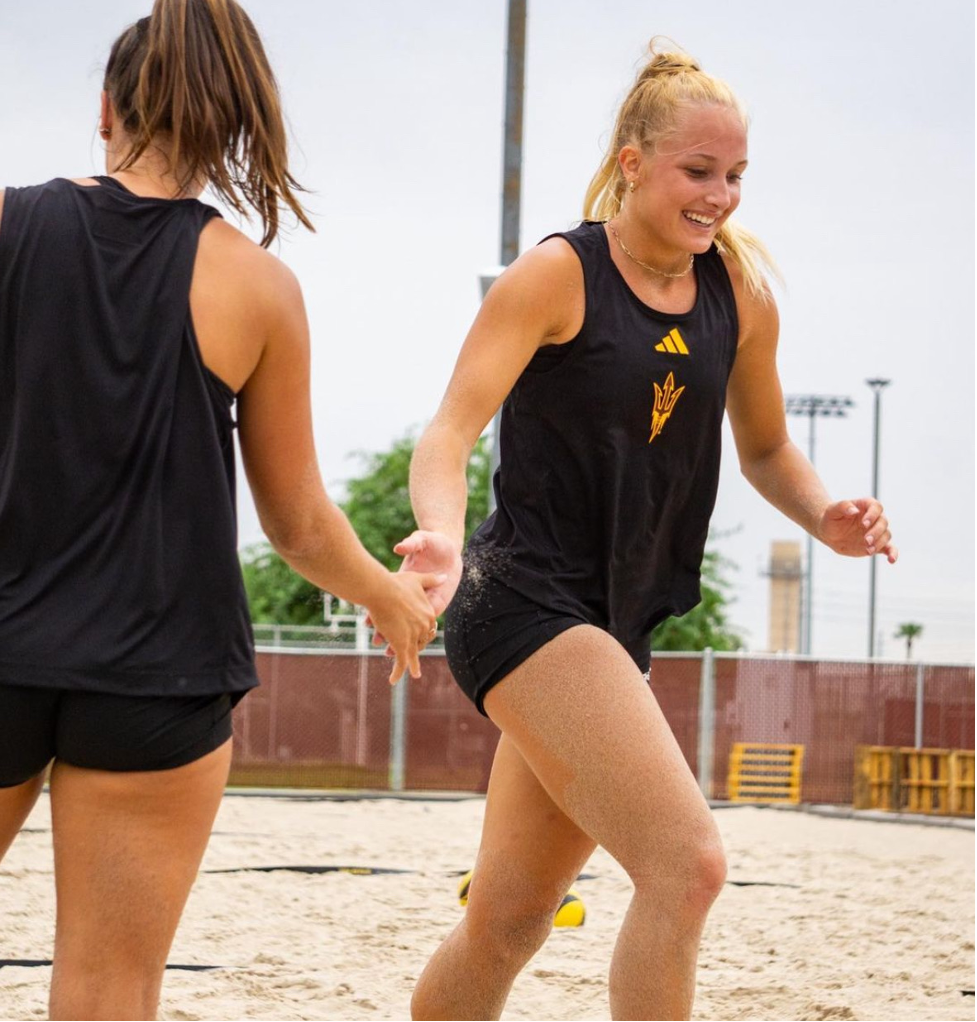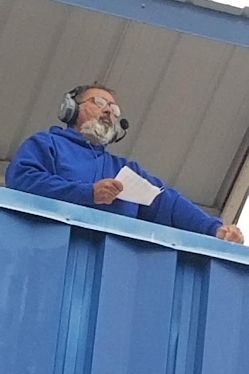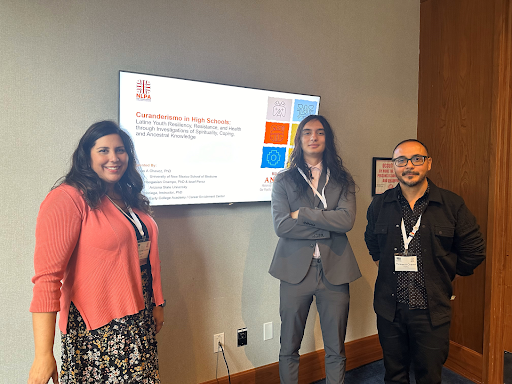Athletes, first responders, military personnel and performing artists all have something in common — they are highly prone to anxiety, depression, substance abuse and other mental health issues, partly due to their intensely stressful work environments. The new sports and performance counseling concentration at Arizona State University is training students to support these communities.
“Research suggests that there is a strong relationship between physical performance and psychological wellness, and counseling is integral to optimal career performance and overall psychological well-being,” said Professor Ayşe Çiftçi, director of the School of Counseling and Counseling Psychology in ASU’s College of Integrative Sciences and Arts, where the new concentration is offered as part of the Bachelor of Science in counseling and applied psychological science.
Decorated athletes Simone Biles, Naomi Osaka, Michael Phelps and many others have brought international attention to the crushing mental pressures of athletic competition — and the positive results that can come from counseling therapy.
At ASU, Sun Devil lacrosse midfielder Brynn Holohan, recognizing how essential mental health support is for collegiate athletes, launched the ASU chapter of Morgan's Message, an organization named for Morgan Rodgers, a student-athlete at Duke University who lost her battle with depression and took her own life.
ASU men’s basketball is also aiming to boost the mental health of their athletes. Last summer, the team invited Rachel Ocampo Hoogasian, a clinical assistant professor in the School of Counseling and Counseling Psychology, who helped launch and teaches in the sports and performance counseling concentration, to join the team abroad for the 2023 Ellie Ziegler Foreign Tour to enrich the experience for participating athletes.
“Coaches indicated that having a class focused on team cohesion and mental performance was important because a large number of players on the team had transferred in from other universities this season,” Ocampo said.
Furthermore, Çiftçi noted that in 2003, the American Psychological Association’s Council of Representatives approved a postdoctoral proficiency in sport psychology for the first time.
“That action amplified a need for this discipline,” Çiftçi said. “And given the national discussion around athlete wellness, sport performance and mental health, we are very excited to offer this new concentration.”
The new concentration is based at ASU’s Polytechnic campus and offered through ASU Online and ASU Local. Soon, it will also be available at the Tempe campus.
Maintaining motivation and mindset
ASU beach volleyball player Hayden Huber, a first-year sports business student, during her first practice at ASU. Courtesy photo
Since the concentration’s launch, it has drawn national attention. Head coach of the Penn State Berks baseball team and ASU senior Erik Amspacher, a political science major, is one of 29 students to enroll in the first course offered in the concentration — CAP 121: Introduction to Sport, Exercise and Performance Psychology. Amspacher said he enrolled because he “would like to learn how to recognize when his athletes are struggling mentally as well as physically so he can help them become better athletes.”
The online course, which began Oct. 11 in ASU’s Fall B session, has attracted a number of coaches and athletes, said CAP 121 instructor Ocampo — like ASU triathlete Katy Clausen. Clausen is a senior majoring in psychology in ASU’s College of Liberal Arts and Sciences and minoring in counseling and applied psychological science in the College of Integrative Sciences and Arts. She has been involved in sports since childhood and now, as a swim coach, said she wants to learn healthy ways to motivate her team.
Similarly, Millie Quin, a first-year sociology student in the College of Integrative Sciences and Arts, is on ASU’s water polo team and taking CAP 121 “to learn about performance anxiety and what athletes can do to give them the extra edge when it comes to game day.”
Like Quin, ASU beach volleyball player Hayden Huber, a first-year sports business student in ASU’s W. P. Carey School of Business, enrolled in CAP 121 because she is also interested in learning about mitigating anxiety and “keeping a consistent positive mindset in practice and competition."
Integrating lived experience and undergraduate research opportunities
While developing courses for this new concentration, Ocampo — a licensed psychologist who worked with youth and families at her private practice prior to joining ASU in 2020 — harmonized her professional experiences and her lived experiences as a Latina who grew up in a large football family and a former competitive athlete herself.
She said this integration helps bring textbook concepts to life and is especially important when teaching students like Amspacher, Clausen, Quin, Huber and others who have already experienced the psychological impacts of sports.
Ocampo also launched an undergraduate research lab in the School of Counseling and Counseling Psychology — the Culture, Athletics, Spirituality and Mental Health Research team, or CASMR — to give undergraduate students who have a passion for these topic areas an opportunity to learn and engage beyond the classroom, she explained, and who may have interest in continuing on to graduate school.
CASMR students are currently investigating the mental health stressors and strengths of Latino youth and families as well as the triumphs and tribulations of football coaches and players.
Active CASMR member Hunter Kowal (left), a senior majoring in psychology and minoring in counseling and applied psychological science in the College of Integrative Sciences and Arts, and Clinical Assistant Professor Rachel Ocampo Hoogasian (right) presented at the Society of Psychological Study of Culture, Ethnicity and Race annual convention in San Diego. Photo courtesy Rachel Ocampo Hoogasian
The toll behind the touchdown
Ocampo’s firsthand experience with the life-changing opportunities that extracurriculars like football can provide to families fueled one of CASMR’s current research projects: investigating the experiences and contributions of football coaches.
“Football was a catalyst to my dad’s future success because it improved his life and eventually his family’s life,” said Ocampo, who was coached by her father from a young age.
Football as a pathway toward educational advancement shaped the life of Clinical Assistant Professor Rachel Ocampo Hoogasian’s father. Photo courtesy Rachel Ocampo Hoogasian
CASMR interviewed 70 high school football coaches across the country and discovered that football coaches are a “dying breed” because the level of commitment they put into coaching young people can be taxing, and it far outweighs what they are paid — a teacher’s salary plus a stipend that doesn’t exceed a few thousand dollars per season.
“At-risk youth and youth of color are the largest demographic that utilize extracurricular activities,” Ocampo said. “Coaches we interviewed indicated that 60%–70% of their players come from single-parent families or are raised by grandparents. They added that sports are often the number-one motivator for players to attend and persist in school.”
Consequently, football coaches wear multiple hats to maintain a focused team, said Ocampo, who presented this project at the Society for the Psychological Study of Culture, Ethnicity and Race annual convention in San Diego.
“They are coaches, teachers, father figures, counselors and preachers,” she continued. “What can we do as a society to support these coaches so they can continue elevating their players?”
The data collected from this study, Ocampo said, emphasizes the need to give a voice to minority coaches’ experiences and the important mentorship roles they play for minority players; highlights systemic and interpersonal racism that impacts minority coaches and players' abilities to be successful on and off the field; and encourages stakeholders to take hard looks at the ways they can support all coaches and, consequently, all student-athletes.
The study’s data motivated Ocampo to write a new sports psychology book, “It's All About the Relationship: Honoring the Wisdom of High School Football Coaches and the Life-Transforming Work They Do with Young People,” which will be available soon. She said the book will honor her father, whose recent stroke ended his time in coaching.
Connecting Latino communities to their roots
From left: Rachel Ocampo Hoogasian, a clinical assistant professor in the School of Counseling and Counseling Psychology at ASU, Iosef Perez, a CASMR member and sophomore majoring in psychology and minoring in counseling and applied psychology at ASU, and Tom Chavez, a research professor at the University of New Mexico, recently presented at the National Latinx Psychological Association Conference in Chicago on expanding a dual enrollment high school curriculum with curanderismo, or Mexican traditional healing, in hopes of connecting adolescents with hands-on coping strategies to promote overall wellness within themselves and their communities. Photo courtesy Rachel Ocampo Hoogasian
Other CASMR research projects center on connecting with Latino youth to learn how they understand spirituality, mental health and social justice. Additionally, these projects strive to reconnect Latino youth with Indigenous and ancestral knowledge.
One of these projects, called “Two Worlds,” involves conducting and analyzing interviews with Western medical providers and therapists who use traditional healing and ancestral knowledge with their patients. This project is tapping into how these methods can expand Western treatment’s ability to effectively help diverse groups of patients, particularly those of Latino descent.
Pursuing licensure
Francisco Sánchez, an associate professor and director of undergraduate training in ASU’s School of Counseling and Counseling Psychology, expects that students in the sports and performance counseling concentration will go on to pursue licensure.
“They can advance to a graduate degree in an applied program such as counseling, social work or marriage and family therapy, to name a few options. For those who wish to advance further, common doctoral degree choices would include counseling psychology, clinical psychology, school psychology and social work,” he said.
The pathways are broad for students who want to pursue a career related to this field, which might include positions in the mental health industry, school psychology, athletics, vocational rehabilitation and youth counseling.
“With this undergraduate concentration, we are opening up pathways for more trained professionals to serve the needs of these populations and laying the foundation for integrating sport performance into our graduate programs, specifically in our APA-accredited PhD program in counseling psychology,” Çiftçi said. “We are very excited about the possibilities of this curriculum.”
More University news

3 ASU students earn Goldwater Scholarships for STEM research excellence
Three Arizona State University students have been named Goldwater Scholars for 2025, placing them among the nation’s most…

Provost Teaching Awardees, Charter Professors empower local communities, students
The ASU Charter embodies the university’s commitment to student success and research of public value and responsibility to…

New online Bachelor of Social Work program exceeding enrollment expectations
Social workers are in big demand.Citing U.S. Bureau of Labor Statistics figures, the National Association of Social Workers…






